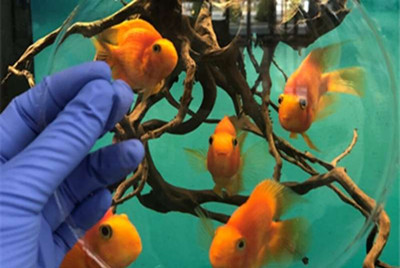
The Korea Research Institute of Chemical Technology (KRICT) has developed a bio-polycarbonate which has been monopolized by Japan, and has opened up the possibility of bio-polycarbonate commercialization.
Bio-polycarbonate is an eco-friendly bio-plastic that can replace conventional polycarbonate, which contains the environmental hormone causing substance, bisphenol A (BPA). Until now, Mitsubishi Chemical Corp. of Japan is the only company to successfully commercialize production of bio-polycarbonate.
Dr. Jeyoung Park, Dr. Dongyeop Oh, and Dr. Sung Yeon Hwang of the Research Center for Bio-based Chemistry of KRICT utilized the plant-based components of isosorbide and nanocellulose to develop the bio-polycarbonate.
BPA is a petrochemical substance and an environmental hormone that causes endocrine disruptions and metabolic complications. It is mostly used in polycarbonate, and the usage of this substance is prohibited in milk bottles and cosmetics in Korea. It is also used in receipt papers and the coating materials of canned foods.
For that reason, bio-polycarbonate has received attention as an alternative to polycarbonate containing BPA. However, it is difficult to simultaneously satisfy both economic feasibility and high mechanical performance of general plant-ingredient plastics. KRICT overcame this problem with the combination of isosorbide and nanocellulose, and succeeded in producing bio-polycarbonate that surpasses petroleum-based polycarbonate.
Isosorbide, an eco-friendly compound derived from glucose, not only improves the mechanical properties of the incorporated polymer, but also possesses good optical and UV-resistive properties due to its unique molecular structure.
The research team applied the principle of "like dissolves like" where similar compounds mix together better. Isosorbide well mixed together with nanocellulose as a bio-derived reinforcing agent because both substances are hydrophilic and have a similar structure. Then, the polymerization process of the nanocomposite plastic was carried out. The well dispersed nanocellulose acted like metal rebar in concrete and thus maximized the strength of the bio-plastic.
Dr. Jeyoung Park of KRICT said, "We wanted to break the stereotype that bio-plastic has inferior mechanical properties and is expensive." Dr. Park continued, "Through the synergistic interplay between the plant-based ingredients, we were able to develop a bio-plastic that is superior to petroleum plastic." As a result, it significantly improved the physical properties of the bioplastic such as strength and transparency, which have been pointed out as limitations of general bio-plastics.
The developed bio-polycarbonate exhibited a tensile strength (how strong a material is) of 93 MPa. This is the highest measurement to date amongst existing petroleum and bio-polycarbonates. The tensile strength of petroleum polycarbonate ranges from 55 - 75 MPa, while the tensile strength of the bio-polycarbonate of the Japanese firm Mitsubishi Chemical Corp. is 64 - 79 MPa.
The light transmittance, which represents the transparency of the plastic, was measured at 93%. This is due to the suppressed crystallinity through the dispersed nanocellulose, and the result is very superior to commercially available petroleum polycarbonate. This is outstanding because most nanocomposites have a reduced transparency because nonuniform aggregates scatter light. In addition, there is no risk of discoloration even after extended exposure to ultraviolet rays since there are no benzene rings in bio-polycarbonates, unlike petroleum polycarbonates.
Consequently, bio-polycarbonate can be used as an industrial material for applications including automobile sunroofs, headlights, transparent highway noise barriers, and exteriors of electronics such as smartphones. The material is thus expected to be a viable alternative to existing polycarbonates.
Also, the low toxicity of the material was verified through animal in vivo inflammatory testing using a rat model, supporting the potential of the material for biomedical applications. Injection of the polymer into the subcutaneous tissue was conducted to test the presence of inflammation, and a toxicity level of 1, from a range of 0 - 5, was measured (toxicity is lowest when the value approaches 0).
Dr. Dongyeop Oh of KRICT said, "A low toxicity result was obtained from the in vivo inflammatory testing using a rat. The toxicity level is safe for infants and children to put in their mouth, which means that the materials can be used for medical purposes in such things as implants and artificial bones, as well as toys, milk bottles, and baby strollers."
The market size of petroleum polycarbonate based on the current production is about 5 million tons annually and the bio-polycarbonate annual production capacity of Mitsubishi Chemical Corp. is approximately 20,000 tons. Although the bio-polycarbonate market is still in its infancy, the transition to commercialization due to this accomplishment is expected to contribute to domination of the bio-plastic market in the future.
This research achievement entitled "Preparation of synergistically reinforced transparent bio-polycarbonate nanocomposites with highly dispersed cellulose nanocrystals" was featured on the front cover of the October issue of Green Chemistry of the Royal Society of Chemistry, which is the highest authority in the field of green chemistry, and it was simultaneously selected as a Hot Article of 2019.
KRICT Bio-based Chemistry Research Center Director Dr. Hwang Sung Yeon explained, "Fear of plastics is growing because of issues like plastic waste and chemophobia, but plastics have become an essential part of everyday life, so we will develop bio-plastics that people can use without fear."

